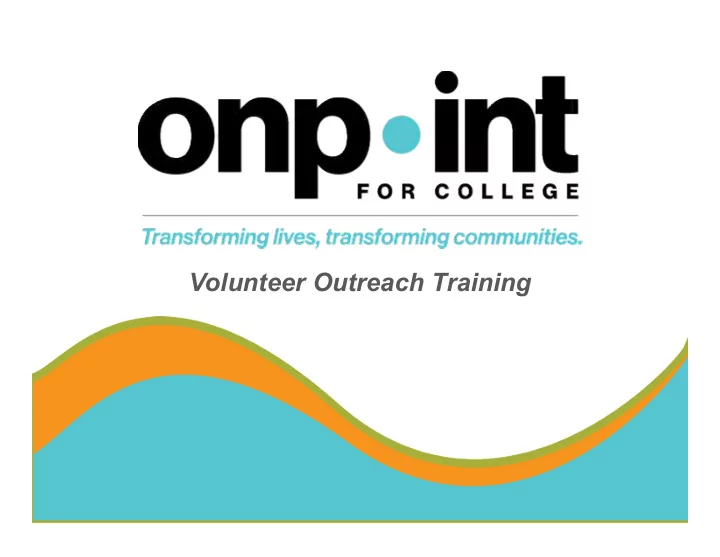

Volunteer Outreach Training
Contents • Staff overview • Outreach call model • General information • Types of outreach • Intersectionality • Best practices • Feedback, follow-up • Who should I contact? • Training resources, next steps
Programming Lead Advisors • Can offer helpful instruction on how to interact with students • Provide updates to student contact lists Michelle Mahoney Anny Guerrero Syracuse Lead Advisor Utica Lead Advisor
Programming Team (Each advisor is assigned a caseload letter) Casey Williams Oandhi Brown Kishma Alexander Nicole Damboise LuPway Doh Syracuse Advisor Syracuse Advisor Syracuse Advisor Oswego Advisor Utica Advisor
Career Services Team Thomas Hoang Latasha Luckie Career Services Career Services Advisor Advisor
Why Outreach Calls Matter • Help our advisors become aware of immediate student needs. • Keep students engaged in the program. • Validate student feelings. • Help create student accountability and vision.
Commitment • Month-to-month commitment. • Approximately 5 calls per week, or 20 per month. • Can’t make calls one month? Let the Volunteer Coordinator know.
General Expectations • Use your own phone, always leave a call back number. • Protect the student’s identity and contact information. • Call each student once a month. • Return voicemails and texts within 24 hours. • Submit feedback using the Volunteer/ Student Interaction Form.
Contact Lists • All volunteers start will 20 student names, unless otherwise requested. • On a quarterly basis, Lead Advisors will remove and replace numbers belonging to students you are unable to get in contact with. – Lists will retain numbers belonging to students you have had an interaction with.
Recurring Outreach Start of semester Aug/ Sep Jan/ Feb Mid-semester Oct/ Nov Mar/ Apr End of semester Dec May College break check-in Jan Jun/Jul Career services check-in Year-round General health and wellness
Non-recurring Outreach Graduation calls Dec May Event announcements Year-round
What is Intersectionality? • Our students come from a variety of backgrounds. • Our culture and environment impacts our beliefs and mindsets. • Understanding where we come from can help identify biases.
Things to Do • Mention On Point for College. • State your name and the advisor you’re working with. • Clarify what the phone call is about. • It takes time! Communication is 97% non-verbal. • Keep it positive, encouraging, and informative.
Keep Students Engaged • Talk about On Point services. • Advertise our social media. • Opfc.cc/rsvp - Students can sign-up for Career Services events. • Opfc.cc/help - Students can sign-up for tutoring, mentoring, mock-interviews and more.
Connecting With Students • It’s normal not to connect with everyone – don’t be discouraged! • Students usually answer the phone later in the day. • You may not get to every question in one call.
Get Students to Share More • Rephrasing the question can lead to greater discovery! • Layer your questions to “peel back the onion”. Example: 1. What is your most difficult class? 2. What is the most difficult part of that class? 3. When is your next exam or assignment? (think ahead) 4. What goal do you want to achieve by the end of this class?
Building Rapport • Be careful about assumptions. • Tone matters! • Make the script your own. • Take cues from the student. • Listen actively. • Let the conversation flow naturally. • Don’t take things personally!
Things Not To Do • Don’t make promises. • Avoid telling students what they “should” do. • Don’t monopolize the conversation. • Say, “I’ll get back to you on that” instead of, “I don't know”.
Feedback is Everything • Helps us keep accurate student records: • When was the student last contacted? • What was the student contacted about? • Feedback on attempted interactions helps us find new avenues to try and get in touch with our students. • Share stories about your experiences.
Interaction Scenarios Types of calls Response Feedback Spoke with student Call monthly 24-48 hours later Left a message After 3 rd attempt Try texting Voicemail full/ not set up Phone not in service Dropped call/ hang up After 1 st attempt Stop calling Wrong number Number belongs to a relative
Sense of Urgency Topic Response Dropping out of school Academic probation/ warning Depression/ anxiety Urgent Family conflicts or abuse Unplanned pregnancy Access to food/ housing Financial stress Needs advising Financial aid or textbook questions
Volunteer/ Student Interaction Form
Who Should I Contact? • Lead Advisor • Learning gaps on interactions with students • Updates to contact lists • Volunteer Coordinator • Learning gaps on outreach process • Feedback on outreach role • Need a break from outreach
Training Resources at opfc.cc/forms
Next Steps • Receive an e-introduction to a Lead Advisor by Friday. • Receive your student contact list by next Friday. • The Volunteer Coordinator will announce question categories at the end of each month.
Thank You!
Recommend
More recommend